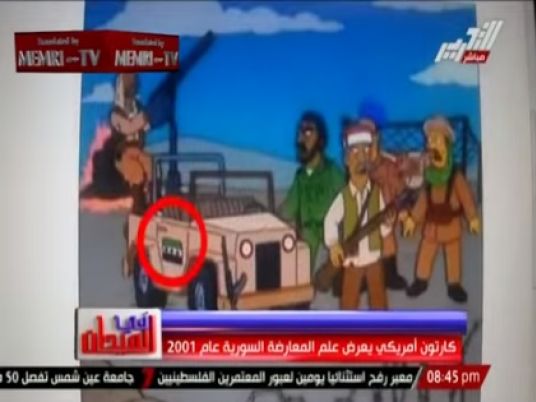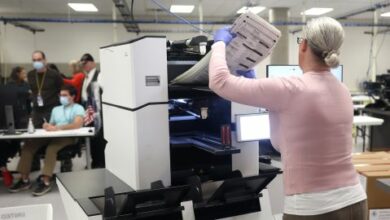
The Simpsons was well known as a source of entertainment for generations worldwide, but in Egypt, a TV station has now claimed that a scene in the sitcom animation is showing that the Arab Spring is an American conspiracy.
The Tahrir TV anchor Rania Badwy presented evidence that “suggests what is happening in Syria today was premeditated.” All is set amidst conspiracy theories taking hold of society after three years of post-revolution turbulence and paranoia.
Badawy presented a 75-second clip of a Simpsons episode that first broadcast in 2001, showing a scene of soldiers dressed as Arabs, standing next to a jeep painted with a picture of a flag which is similar to the one used by the opposition Free Syrian Army during the ongoing civil war in Syria.
“The flag that appeared on the vehicle on which the bombs were dropped is the flag of the Syrian opposition. This is from 2001 – before the existence of the ‘Syrian opposition,’” the anchor commented on the clip in her report aired on Al-Tahrir TV on 4 May 2014.
“The flag was created before the opposition exists in reality. In 2001, there was no such thing as the flag of the Syrian opposition.” Badwy says “The appearance of the flag raises many question marks about what happened in the Arab Spring revolutions and about when this global conspiracy began.”
Back to the history, the Free Syrian Army’s green-white-black flag was used two times in Syria, the first in 1932 for the Syrian independence from France and then readopted in 1961 and 2012 to mark the opposition seeking to overthrow Bashar regime.
The old flag was replaced by a red, white and black tricolor to represent the United Arab Republic flag since 1980.
Yet, there is no explanation why the old flag used in the episode, but some think it was a coincidence, dismissing it was a conspiracy theory “We shouldn’t build a theory on seeing an old flag in a TV show, it might be coincidental” said Ikram Fawzy, a graphic designer.
During the 18-day revolution, both state and privately owned media alleged that the uprising was cooked by foreign plotters and agents. “But with Mubarak’s ouster, they back tracked, admitting what happened was a real revolution,” said Mohamed Ali, a media professor.
According to Ali, media in Egypt is somehow a source of rumors and conspiracy theories as they do not verify news before it is published. “I see many anchors are funny as their news is based on shallow judgements and biased views rather than informative facts.”
A year ago, the “Simpsons” video was uploaded on YouTube by Bashar regime supporters in which they claimed the flag was a hidden message suggesting that Bashar opponents are being fooled by foreign plotters.
Elsewhere, some claimed that the Fox-produced cartoon foretold the 9/11 events four years before it happened in 2001. The episode this time entitled “The City of New York vs. Homer Simpson,” that appeared in 1997 was showing a scene of a paper where New York, 9/11, splashed on the cover page, showing 11 on the shape of the twin world trade center towers.
Conspiracy theories have been widely on the rise in Egypt, extending from media outlets to individuals and even to the judiciary, especially after the 3 July military takeover, fomented by highly polarized media in a climate of fear and trauma.
After the violent breakup of the pro-Morsy sit-ins in mid-August, state-run newspaper Al-Ahram published a report referring to what it calls ''the Zionist-American-Muslim-Brotherhood conspiracy'' against Egypt, the paper argued that ''America, Israel and the Muslim Brotherhood have one goal in common. It is to demolish the Egyptian army and to balkanize the country.''.
Meanwhile, Brotherhood sympathizers have been also blaming Western conspiracies for the events. Kuwaiti Al-Watan paper published an article leading with “What happens in Egypt is a conspiracy against Muslim Brotherhood by the US, the West and Zionists.”
Suspecting the Simpsons this plot, however, would not be the first time a fictional character has been tied up in controversy.
In an unprecedented high level of public skepticism, a popular Egyptian puppet called Abla Fahita was accused in December 2013 of aiding terrorists in its televised commercial for Vodafone mobile company. In the advertisement, Abla Fahita was looking for a SIM card of her dead husband, she suggested using a sniffer dog at a shopping mall in an effort to locate the card.
The state security prosecutor put the Muppet-style character under investigation after complaints from a conspiracy theorist nicknamed Ahmad Spider that Abla Fahita is a British agent and sending coded messages for planned attack on a shopping mall.
Despite a statement from Vodafone that the skit was meant to explain to consumers how to reactivate old card, Spider, an opponent of Egypt’s 2011 uprising, interpreted the reference to the mall as a hint for the location of an upcoming bomb attack.
“The dog, garage, guard, mall and next to us, these are elements tell us that there will be a big mall and an explosion after a dog fails to find the bomb in a car,” Spider said.



